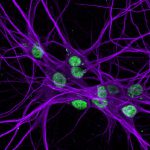
Research at the University of Pittsburgh and UPMC into amyotrophic lateral sclerosis (ALS), commonly known as Lou Gehrig’s disease, received a significant boost this week with the donation of $500,000 by LiveLikeLou.org, a donor-advised fund of The Pittsburgh Foundation.
Last year, the Live Like Lou Center for ALS Research was established at the Pitt’s Brain Institute (UPBI) with the help of a starting gift from LiveLikeLou.org. The fund was created by Neil and Suzanne Alexander at The Pittsburgh Foundation in 2011, soon after Neil Alexander was diagnosed with ALS at age 46. LiveLikeLou.org pledged to raise $2.5 million for the research center in five years.
The starting gift given last year was matched by Pitt in an effort to raise $10 million in funding for the center. Neil Alexander, who passed away in early 2016, was inspired by the dignity and perseverance shown decades ago by legendary Yankees first baseman Lou Gehrig, who died from ALS in 1941.
Currently, there is no effective treatment for ALS, which causes progressive paralysis and eventually makes swallowing and breathing difficult, if not impossible, while sensation and cognitive function remain unaffected. Patients with ALS live two to five years after diagnosis, on average, with about 10 percent surviving for 10 years or longer.
The Live Like Lou Center at Pitt will focus both on developing new treatments and, ultimately, a cure for ALS, as well as improving the quality of life for people who are now living with the progressive, degenerative neurological condition.
One of the researchers who will contribute to that effort is Chris Donnelly, Ph.D., assistant professor of neurobiology at Pitt and member of the UPBI. Donnelly, whose research is funded by the center, hopes to improve our understanding of ALS by studying cells from patients with the disease. His research involves converting these patient cells into stem cells, which have the potential to become any cell in the body. He then coaxes them in the lab to become neurons in order to study how they are different from normal neurons.
Donor Wall Recognizes Contributions, Showcases Research
In recognition of the efforts of the many individuals and organizations that have contributed to this grassroots effort to advance research, UPMC helped construct a “living” donor wall, located at UPMC Presbyterian. The wall features an updated list of donors who have contributed to LiveLikeLou.org, and features a display that showcases images from research laboratories at Pitt, along with highlights of efforts by the center.







